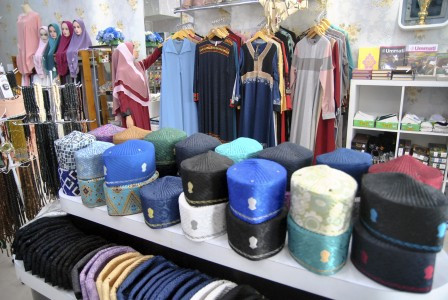Popular Reads
Top Results
Can't find what you're looking for?
View all search resultsPopular Reads
Top Results
Can't find what you're looking for?
View all search resultsMuslim fashion books 90 percent fall in revenue despite Ramadan
The Muslim fashion industry is experiencing a sharp decline in revenue at a time when the Ramadan festivities would normally lead to peak sales, as COVID-19 impacts the economy.
Change text size
Gift Premium Articles
to Anyone
T
he Muslim fashion industry is experiencing a sharp decline in revenue at a time when the Ramadan festivities would normally lead to peak sales, as COVID-19 impacts the economy.
“It impacts the stockpiling of [products] and also causes their revenue to drop,” the ministry’s small and medium enterprises (SME) director general, Gati Wibawaningsih, said in a virtual press briefing on Friday.
In response, some enterprises have shifted their production from Muslim clothing to protective personal equipment (PPE) or face masks to survive the economic downturn, according to the ministry.
The social restrictions enforced to contain the spread of the virus, which has infected more than 12,700 people nationwide as of Thursday, is deemed to cause dwindling sales.
With lower budgets and more worries, the middle-income population in Greater Jakarta was projected to reduce their Ramadan spending in general by 36 percent, according to a survey released in April by Mobile Marketing Association (MMA) and SurveySensum.
Outside of Jakarta, spending by the middle-income population is projected to drop by 27 percent, the report reads.
To minimize the financial woes, the government is partnering with e-commerce company Shopee Indonesia in promoting local Muslim fashion.
Shopee Indonesia has seen the number of visitors to the website surge by 25 times compared to normal days since the start of Ramadan, the company’s head of public policy and government relations, Radityo Triatmojo, says.
The e-commerce platform has pledged to provide three times more products than usual to promote an online shopping festival between May 12 and 20.
“We understand that in this situation, many rely on the online marketplace,” Radityo said at the same briefing. “This opens the chance to seize the online business opportunity.”
Elzatta, a local Muslim clothing retailer operating 200 stores across the country, is adapting to the coronavirus-induced economic downturn by participating in Shopee Indonesia’s online shopping festival, according to the company’s vice president, Tika Latifani Mulya.
The company is also utilizing social media as well as its website and mobile application to promote its products.
“We usually install a billboard and publish flyers during Idul Fitri, but not this year,” Tika said at the same briefing. “We are using social media as much as we can, because we cannot bear too much cost either.”
Industry Minister Agus Gumiwang Kartasasmita said the Muslim fashion industry should not miss the opportunity from the booming global market for Muslim clothing.
Global spending on Muslim clothing was recorded at US$283 billion last year and projected to grow by 6 percent on average annually, according to the State of the Global Islamic Economy report released last year.
“There is an opportunity for our Muslim fashion industry to become the number one and center of the world’s Muslim fashion in the not-so-distant future,” Agus, a Golkar Party politician, said in the same briefing.
He added that the industry’s success would have an impact on supporting sectors, such as tailors, raw material providers and logistics.










